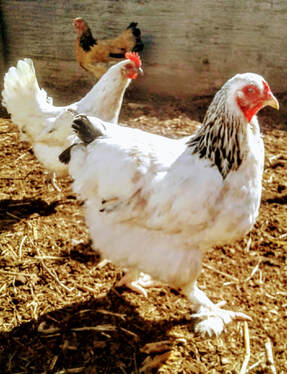Everything you need to know about feeding your laying hens for good health and the best egg production.
 Angie and Rescued Hen Friends at CHOE
Angie and Rescued Hen Friends at CHOE
There are many types of laying feed available on the market but the one you really want is the one which is healthiest for your chickens and will help them lay better eggs.
Mature hens who are producing eggs should be fed a complete and balanced 16% laying feed which can be mash, pelleted or a mash concentrate mixed with grains and soybean meal.
Most laying feeds have a lower salt content which reduces wet droppings.
If you plan to hatch the eggs give your hens vitamin supplements:
If the intended use of the eggs the hens are laying are going to be hatched then the laying feed should be fortified with vitamins or a vitamin supplement which can be added to the water, doing this will help reduce the chances of birth defects in the future baby chicks.
For slow or no egg production:
If your hens are experiencing slow or no egg production due to stress or illness, increasing their protein and vitamins can help get them back on track. A good laying feed should provide a healthy balance of proteins, vitamins, amino acids, and minerals (1). Laying hens can be given 18% or 20% layer feed can be given for slow or no egg production times and during molting to supplement additional protein needs and increase shell strength.
Mature hens who are producing eggs should be fed a complete and balanced 16% laying feed which can be mash, pelleted or a mash concentrate mixed with grains and soybean meal.
Most laying feeds have a lower salt content which reduces wet droppings.
If you plan to hatch the eggs give your hens vitamin supplements:
If the intended use of the eggs the hens are laying are going to be hatched then the laying feed should be fortified with vitamins or a vitamin supplement which can be added to the water, doing this will help reduce the chances of birth defects in the future baby chicks.
For slow or no egg production:
If your hens are experiencing slow or no egg production due to stress or illness, increasing their protein and vitamins can help get them back on track. A good laying feed should provide a healthy balance of proteins, vitamins, amino acids, and minerals (1). Laying hens can be given 18% or 20% layer feed can be given for slow or no egg production times and during molting to supplement additional protein needs and increase shell strength.
But seek ye first the kingdom of God and His righteousness and all these things shall be added unto you. Matt. 6:33
Reference: 1. Poultry nutrition and feeding handbook .http://www.ag.auburn.edu/~chibale/an12poultryfeeding.pdf

